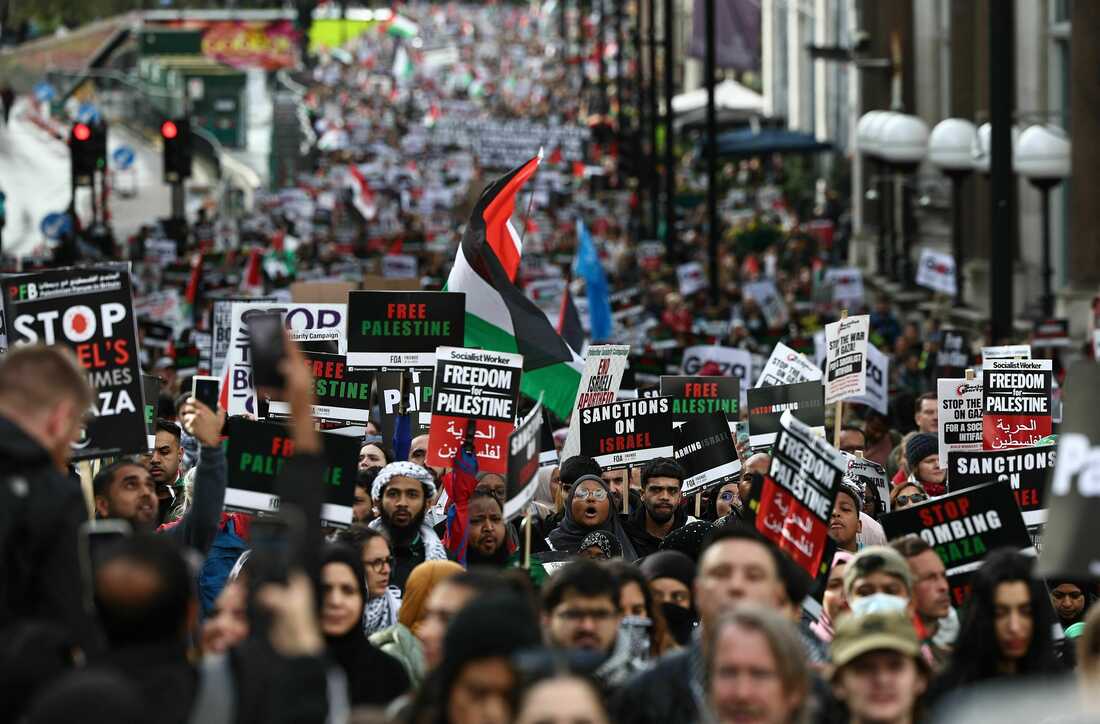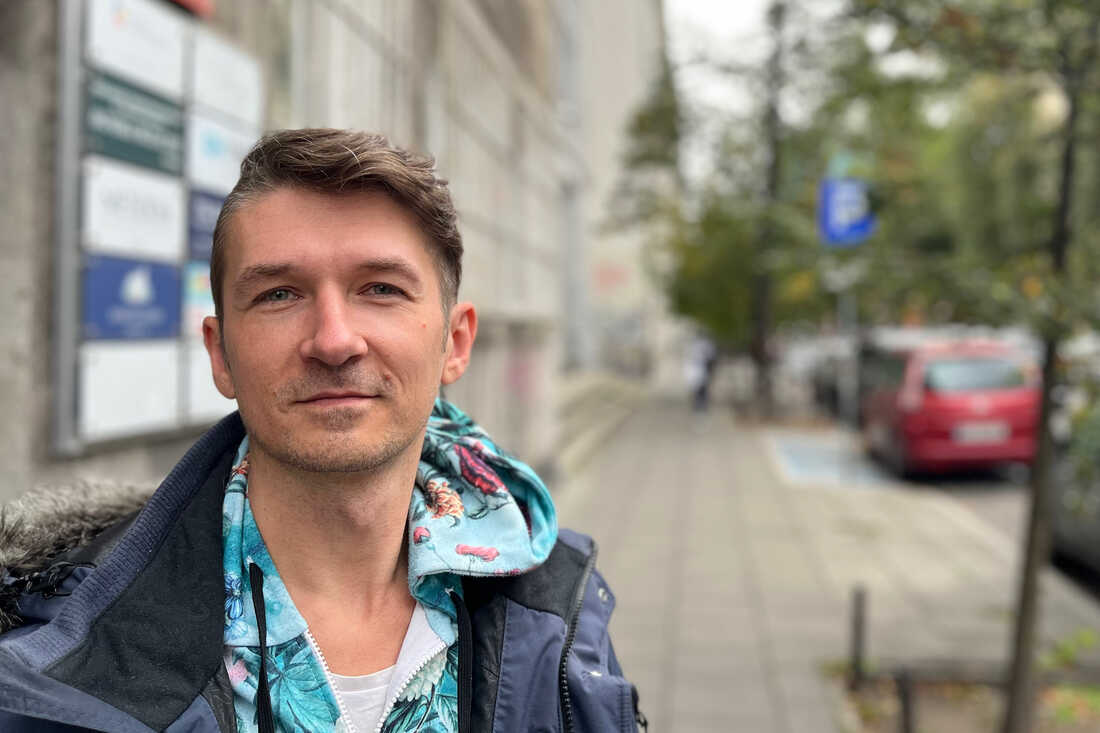Anger grows over Ukraine's largest Orthodox church, aligned with Moscow despite war
By Brian Mann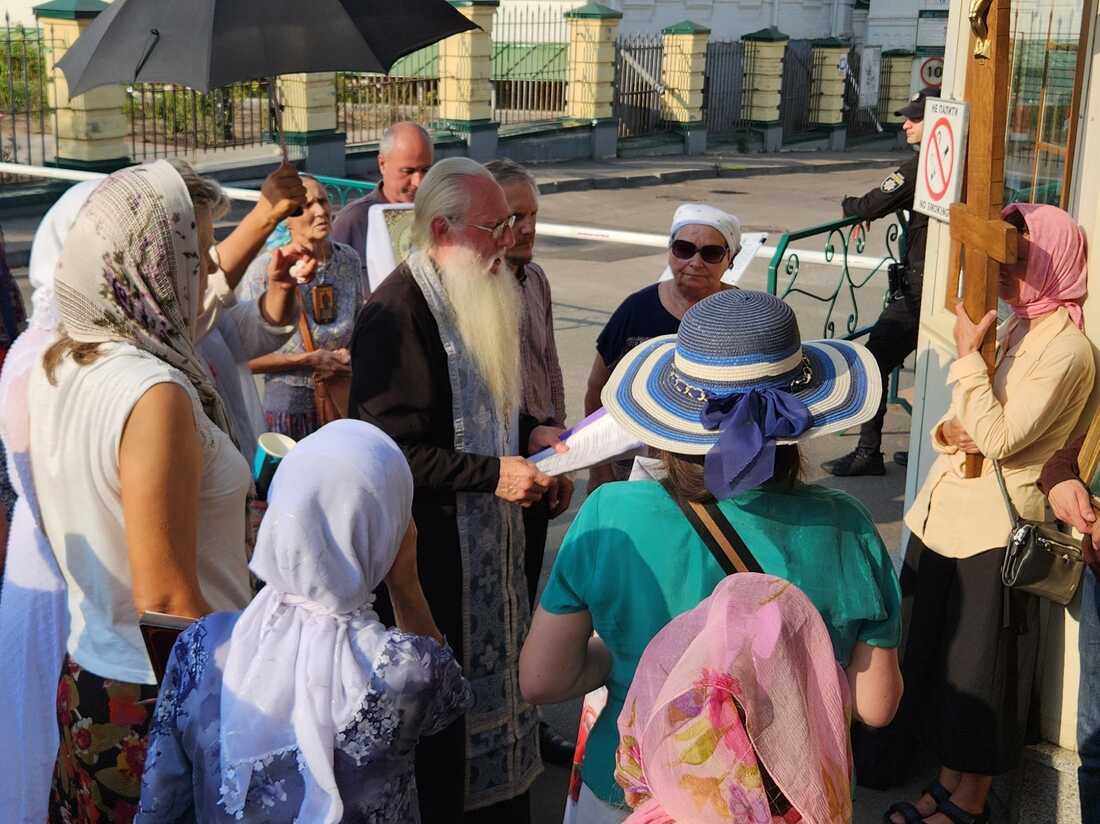
Worshippers loyal to the Moscow-affiliated Orthodox church gather for a protest service outside a monastery in Kyiv. Many believers say they're loyal both to Ukraine and their traditional faith. Brian Mann/NPR hide caption
toggle caption Brian Mann/NPRWorshippers loyal to the Moscow-affiliated Orthodox church gather for a protest service outside a monastery in Kyiv. Many believers say they're loyal both to Ukraine and their traditional faith.
Brian Mann/NPRKYIV, Ukraine — On a recent autumn afternoon, Ukrainian worshipers with a branch of the Orthodox church long tied to Moscow gathered on a street outside a monastery in Kyiv to sing and pray.
They come here often as an act of protest against a decision issued by Ukrainian authorities earlier this year.
Government officials effectively banished clergy loyal to the Moscow patriarch from the most sacred parts of a nearby gold-domed monastery complex called the Kyiv Pechersk Lavra.
"Our monks lived here from ancient times," said Metropolitan Clement, bristling with anger. "Access is closed now to clergymen and to many believers who could come to to pray here even in Soviet times."
Russian soldiers who die in the conflict that their "sacrifice washes away all sins."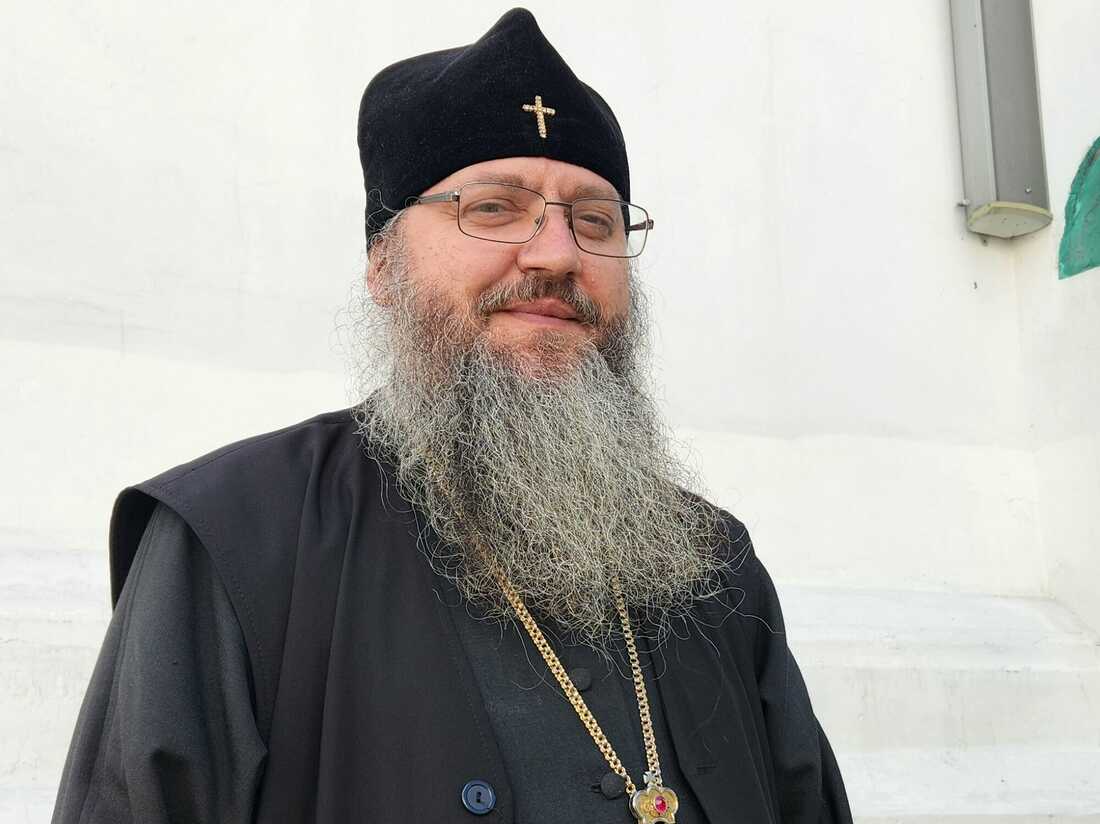
Metropolitan Clement is spokesman for the Ukrainian Orthodox Church-Moscow Patriarchate, which has been governed by Russia's Orthodox church since the 1600s. He says millions of his church's believers face religious persecution. Brian Mann/NPR hide caption
toggle caption Brian Mann/NPRMetropolitan Clement is spokesman for the Ukrainian Orthodox Church-Moscow Patriarchate, which has been governed by Russia's Orthodox church since the 1600s. He says millions of his church's believers face religious persecution.
Brian Mann/NPRA militant Russian church retains millions of believers inside Ukraine
The militant role of the Russian Orthodox Church has including Pope Francis, who described Kirill as "Putin's altar boy."
Kirill's embrace of the war also sparked growing rage and division within Ukraine, where millions of Ukrainians still choose to worship in Moscow-affiliated Orthodox churches.
Researchers say before the war began there were roughly 12,000 Orthodox parishes in Ukraine linked to Russia. Over the last 19 months, only about 1,500 of those congregations have voted to join a break-away Ukrainian-led church.
Europe
The religious battle at a Kyiv monastery
"They are really believers, very strong in their faith," said Karen Nikiforov, a , explaining why more churches don't leave the Moscow patriarchate.
He noted the irony that Russia-aligned parishes remain particularly popular in eastern Ukraine, where Russia has destroyed whole cities, committed war crimes .
Nikiforov is himself a member of the Moscow-aligned church.
In an interview with NPR, he said many believers, like himself, feel trapped between two worlds. The war has placed their traditional faith, dating back generations, in conflict with their loyalty to Ukraine.
"Thousands of our believers and hundreds of sons of our priests defend Ukraine," said Metropolitan Clement, in an interview with NPR. "Burials of defenders of Ukraine take place every day at our churches."
In May 2022, clergy within Ukraine's Moscow-aligned Orthodox church circulated a resolution that would have led to a complete divorce from Russia and its influence. .
Critics point out that top clergy in Ukraine also failed to issue a statement denouncing Patriarch Kirill's support for the invasion.
Nikiforov, the religious scholar, said he believes his church hasn't yet done enough to distance itself from Russia. "It's half-half, it's not done, it's not full," he said.
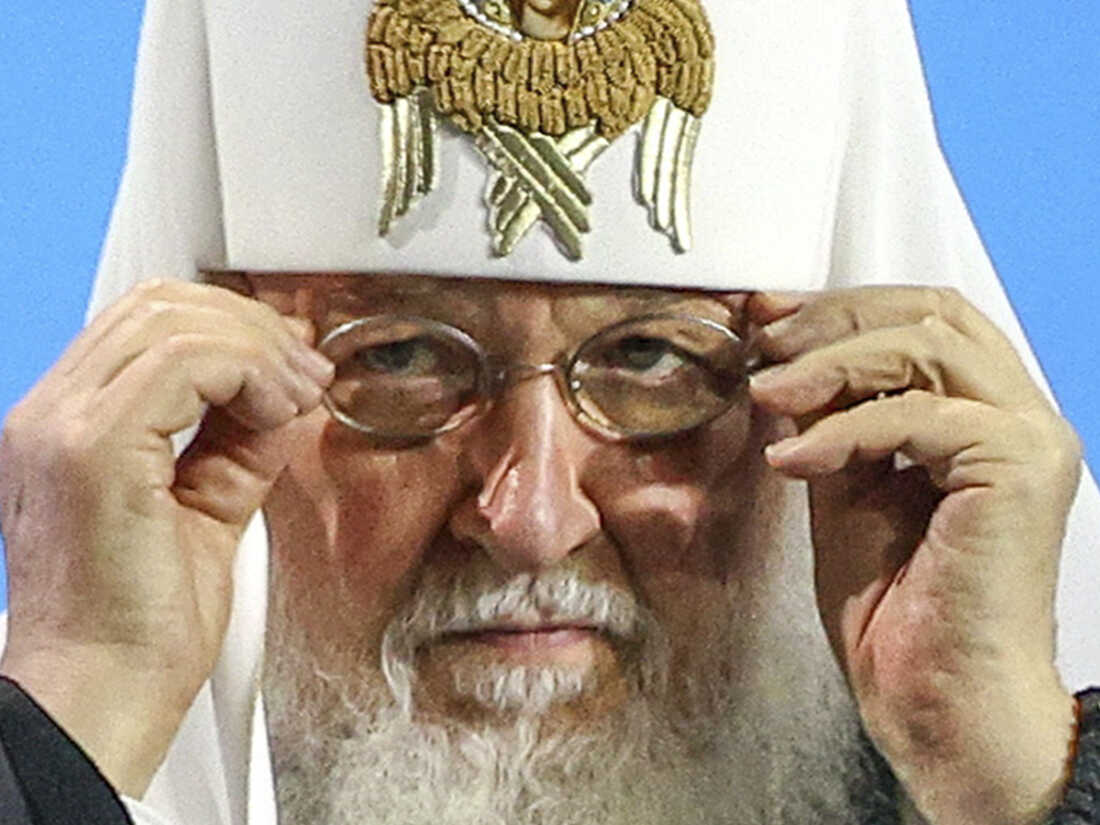
The Mosow Patriarch Kirill, head of the Russian Orthodox Church, has blessed Russia's invasion of Ukraine. He's seen here at an economic summit in St. Petersburg, Russia, July 27. Yegor Aleyev/TASS Host Photo Agency Pool/AP hide caption
toggle caption Yegor Aleyev/TASS Host Photo Agency Pool/APThe Mosow Patriarch Kirill, head of the Russian Orthodox Church, has blessed Russia's invasion of Ukraine. He's seen here at an economic summit in St. Petersburg, Russia, July 27.
Yegor Aleyev/TASS Host Photo Agency Pool/APWiretaps, church raids and priests facing accusations of disloyalty
As the war's bloody toll grows, public anger at Orthodox clergy who remain under Patriarch Kirill's purview has also grown.
It surged again earlier this year after Ukraine's intelligence service, known as the SBU, of a top religious leader, Metropolitan Pavel, apparently praising Russia's invasion.
"There are already Russian flags everywhere," Pavel can be heard saying. "And people are happy. People are happy."
A separate recording released last November appeared to show Moscow-aligned Orthodox believers in Kyiv singing, "Mother Russia is awakening."
Those sentiments sparked outrage and led to regular counter-protests outside the monastery complex in Kyiv.
Angry Ukrainians turn up on most days to confront Orthodox worshippers loyal to the Russian tradition, shouting insults through bullhorns and accusing them of disloyalty.
Mykhailo Omelian is a priest and spokesman for the Orthodox Church of Ukraine, which is fully independent of Moscow. He describes the Moscow-aligned church as a threat. Brian Mann/NPR hide caption
toggle caption Brian Mann/NPRMykhailo Omelian is a priest and spokesman for the Orthodox Church of Ukraine, which is fully independent of Moscow. He describes the Moscow-aligned church as a threat.
Brian Mann/NPRMeanwhile, some religious leaders in Ukraine say it's time for the Moscow-aligned church to be banned outright.
"Our armed forces are repelling the Russian aggressor, but war will return as long as this collaborating Moscow church is here," said Mykhailo Omelian, a priest and spokesman for a separate branch of the Orthodox church governed entirely within Ukraine.
How to balance religious liberty against national security?
This accusation — that Orthodox believers loyal to the Moscow patriarch are a danger to national security — frightens some believers, who insist that their faith is nonpolitical.
Some told NPR they worry their church's banishment from parts of the monastery is only a beginning.
"We're living in a country that's not free and we can't be sure of our safety," said a man who would only identify himself as Vladislov. He told NPR he feared persecution if he provided his full name.
Nikiforov, the religious scholar who worships in a Moscow-aligned church, said he hopes Ukraine's government will find a way to balance these pressures.
He told NPR that government officials should arrest and prosecute anyone, including priests, found to be actively aiding Russia.
But he also said the country and its police should respect the faith of millions of Ukrainians who want to go on worshipping as they did before the full-scale invasion.
"It's impossible to close or to destroy the biggest religious organization in Ukraine," Nikiforov said. "People still will go to underground churches. They will go to [worship] in their rooms or their houses and this is very dangerous for the Ukrainian state."
As the war grinds on, Ukrainian society appears in most ways remarkably unified in opposition to Russia. But there are signs this fault line, where faith and patriotism collide, won't be resolved easily.
Metropolitan Pavel, one of the top leaders of Ukraine's Moscow-aligned church, is accused of secretly backing Russia's invasion. He remains under house arrest in Kyiv awaiting trial on charges of disloyalty.
Meanwhile at protests and religious services in Kyiv, many worshippers carry his photograph and describe him as a martyr of their faith.
Correction Oct. 1, 2023
In a previous version of this story, we misidentified an image of a monastery in Kyiv and also inaccurately described the location of a protest rally in the Ukrainian capital.


